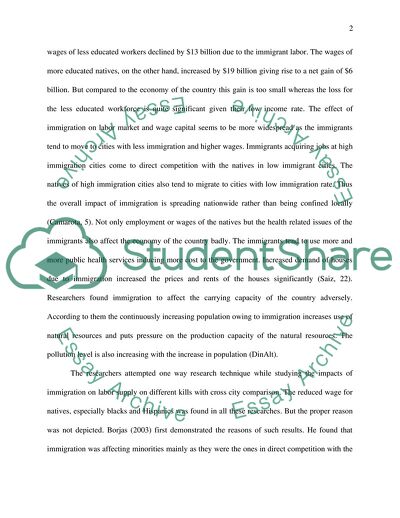
- Home
- Free Samples
- Premium Essays
- Editing Services
- Extra Tools
- Essay Writing Help
- About Us
- Studentshare
- Subjects
- Miscellaneous
- Immigration
Immigration - Essay Example

- Subject: Miscellaneous
- Type: Essay
- Level: Masters
- Pages: 4 (1000 words)
- Downloads: 0
- Author: virginia40
Extract of sample "Immigration"
The most recent policy related to immigration is the policy of immigration reform which tries to restrict immigration more stringently. The policy may be the result of anti immigration views. But there are also groups who support immigration and feel it to benefit America. According to the section of population not supporting immigration, it has a number of negative impacts on the country. Around 68% of American population perceives immigration to be interfering in their personal lives. They feel that immigrants affected the local labor market negatively in terms of wages.
The immigrants are willing to take up jobs at a low wage and are thereby capturing the market over the natives. The job opportunity for the less educated natives has been lowered significantly and immigrants are considered to be better employees. The native born Hispanic and Asian small business owners tend to absorb immigrants from their own countries more than the native born African Americans. According to a study by Newman and Lennon (1995) 41% of immigrants in the sample were able to secure employment within one year in contrast to only 14% of native born African Americans.
This proves the preference for the immigrants over the native African Americans (Camarota, 3). According to a study by NRC wages of less educated workers declined by $13 billion due to the immigrant labor. The wages of more educated natives, on the other hand, increased by $19 billion giving rise to a net gain of $6 billion. But compared to the economy of the country this gain is too small whereas the loss for the less educated workforce is quite significant given their low income rate. The effect of immigration on labor market and wage capital seems to be more widespread as the immigrants tend to move to cities with less immigration and higher wages.
Immigrants acquiring jobs at high immigration cities come to direct competition with the natives in low immigrant
...Download file to see next pages Read MoreCHECK THESE SAMPLES OF Immigration
Illegal Immigration and Immigration Reform
Immigrants and Immigration - America Needs Immigration
Illegal Immigration
Immigration and Immigration Policy Today
Controlled Immigration
Immigration policy
Immigration Enforcement
Immigration Policy

- TERMS & CONDITIONS
- PRIVACY POLICY
- COOKIES POLICY